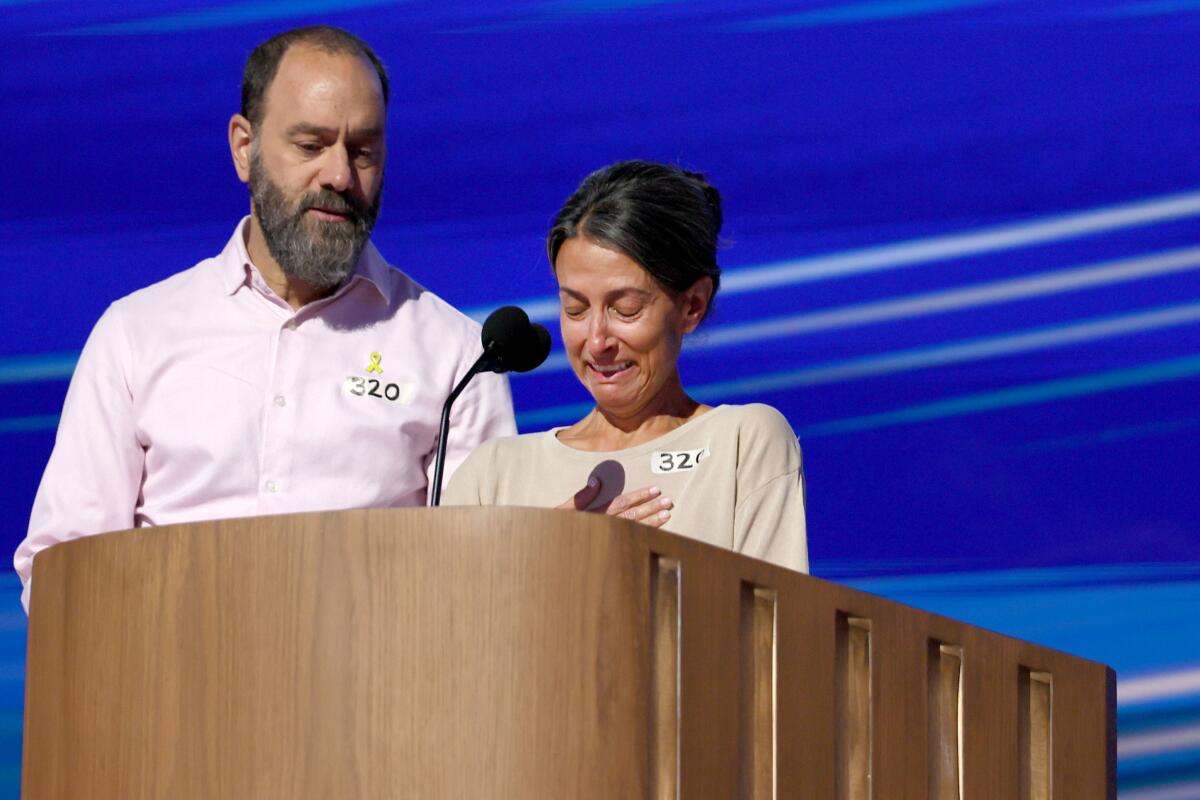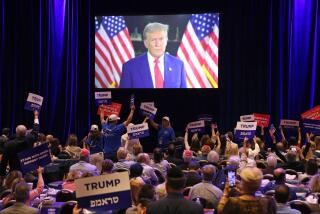As parents of Israeli American hostage address DNC, critics ask: Why no pro-Palestinian speakers?

- Share via
CHICAGO — Rachel Goldberg broke down almost as soon as she stepped onto the stage of the Democratic National Convention.
She put her hand to her chest, bowed her head and then dropped it onto the wooden lectern as the crowd erupted in chants of “Bring them home! Bring them home!” Her shoulders shook.
Then she stood upright and called for the release of her son, Hersh Goldberg-Polin.
“At this moment, 109 treasured human beings are being held hostage by Hamas in Gaza,” Goldberg said. “They are Christians, Jews, Muslims, Hindus and Buddhists. They are from 23 different countries. The youngest hostage is a 1-year-old red-headed baby boy and the oldest is an 86-year-old mustachioed grandpa. Among the hostages are eight American citizens. One of those Americans is our only son. His name is Hersh.”
The Israel-Hamas war has been the main source of division at this week’s gathering of Democrats in Chicago. Thousands of pro-Palestinian activists marched through downtown Chicago on Monday to protest the Biden-Harris administration’s actions on the war. Scores were arrested Tuesday night after violent clashes with police.
The arena was hushed Wednesday night as Goldberg and her husband, Jon Polin, spoke of their son, Hersh, a 23-year-old Israeli American and one of the U.S. citizens held in captivity in Gaza. His left arm was blown off by a grenade Oct. 7 when Hamas attacked the Nova music festival.
It is the first time the Israeli American citizen, who was severely injured when Hamas attacked the Nova music festival on Oct. 7, has been shown alive since his capture.
As Goldberg and Polin addressed the convention, they wore tape on their chests that read 320, a reference to the number of days their son has been held in captivity.
Since Goldberg-Polin was captured, his parents have campaigned ceaselessly for his release. In addition to meeting President Biden and Vice President Kamala Harris, they have met Pope Francis and traveled to New York and Geneva to speak with United Nations officials.
Speaking to Democratic delegates, they eschewed partisan framing of the Israel-Hamas war.
“This is a political convention,” Polin acknowledged, “but needing our only son and all of the cherished hostages home is not a political issue. It is a humanitarian issue.
“There is a surplus of agony on all sides of the tragic conflict in the Middle East,” he added. “In a competition of pain, there are no winners.”
Polin called for a deal that brought all the hostages home, and he also acknowledged the suffering of Palestinian civilians in Gaza.
“In our Jewish tradition, we say... every person is an entire universe,” he said. “We must save all these universes. In an inflamed Middle East, we now the one thing that can most immediately release pressure and bring hope to the entire region, a deal that brings this diverse group of 109 hostages home and ends the suffering of the innocent civilians in Gaza. The time is now.”
After Goldberg and Polin spoke, Abbas Alawieh, a Michigan delegate who said he spoke for more than 100,000 voters who cast “uncommitted” ballots in the Democratic primary, said he “sat with them.”
Pro-Palestinian Democrats face an emotional conundrum: feeling joy over Kamala Harris’ candidacy but despair over the horror in Gaza.
“I was thinking about how, in the Muslim tradition, we know that if you harm or if you kill any one person, it’s as if you harmed or killed all of humanity,” Alawieh said at a news conference held by uncommitted delegates outside the convention hall.
“Every one of those 109 people are people. They’re universes,” he said, referring back to Polin’s speech.
He said he also was thinking of the thousands of children who perished in Gaza. “I could have been one of those children,” he said.
A Lebanese immigrant, Alawieh said he grew up amid terrifying bombing.
He gathered with other uncommitted delegates after Goldberg and Polin spoke to address their main grievance with the convention: no Palestinian representation among the week’s speakers.
“We know that Palestinians and us, we’re all human,” he said. “And so it would be unacceptable for the voices of Palestinians to be suppressed to a level where they’re not even allowed on stage.
“A party that prides itself on family values, and a party that prides itself on protecting children, and a party that prides itself on expanding rights — of course, this is the party where we would be heard,” he added.
But Alawieh said the Harris campaign was asked if a Palestinian could address the convention and the answer was no. Flanked by more than a dozen supporters draped in kaffiyeh scarves, Alawieh broke into an impassioned plea, addressing Biden and Harris.
“You want the bombs to stop? You stop sending bombs,” he said. “It’s actually a very simple idea, Mr. President, Vice President Harris.”
Late Wednesday night, Rep. Alexandria Ocasio-Cortez (D-N.Y.) urged DNC leaders to honor Palestinian voices.
“Just as we must honor the humanity of hostages, so too must we center the humanity of the 40,000 Palestinians killed under Israeli bombardment,” Ocasio-Cortez posted on X. “To deny that story is to participate in the dehumanization of Palestinians. The @DNC must change course and affirm our shared humanity.”
A pro-Harris group, Muslim Women for Harris-Walz, announced on Instagram it was disbanding over the DNC’s refusal to allow a Palestinian American to take the stage.
“The family of the Israeli Hostage that was on the stage tonight has shown more empathy towards Palestinian Americans and Palestinians than our candidate or the DNC has,” the group said in a statement. “This is a terrible message to send to Democrats.”
More to Read
Get the L.A. Times Politics newsletter
Deeply reported insights into legislation, politics and policy from Sacramento, Washington and beyond. In your inbox three times per week.
You may occasionally receive promotional content from the Los Angeles Times.














